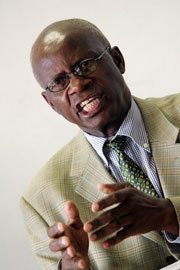
FINANCE and Economic Development minister Patrick Chinamasa presents a low-key 2015 national budget on Thursday which will be overshadowed by the on-going factional wars in the ruling Zanu PF party.
BY VICTORIA MTOMBA
Since the entry of First Lady Grace Mugabe into active politics after accepting nomination to lead Zanu PF’s women’s league, the focus has been shifted from national economics to infighting in Zanu PF ahead of the watershed elective congress next week.
Chinamasa will be presenting his budget at a time the country is recording unprecedented company closures in which an estimated 9 000 jobs have been lost within a year.
This means that government will not be able to collect much in taxes because the informal sector, which now employs the majority, has no fixed location or fixed income flows.
Presenting his budget for 2014, Chinamasa said the structure of the economy had shifted and there was need to formalise the informal sector. There has not however, been any noticeable formalisation of the self-employed sector.
For the third quarter of this year, revenue was 9% below target at US$884,5 million with Value Added Tax (VAT) being the leading contributor of the revenues.
VAT gross collections stood at US$325,7 million against a target of US$321,4 million while refunds amounted to US$75,9million. The VAT were 22% below target.
- Chamisa under fire over US$120K donation
- Mavhunga puts DeMbare into Chibuku quarterfinals
- Pension funds bet on Cabora Bassa oilfields
- Councils defy govt fire tender directive
Keep Reading
In 2013 the revenue targets were met during the first eight months of the year but revenues missed targets in the last quarter of the year. Tax revenues were below target in 2013, reflecting economic slowdown which has spilled into 2014.
Employment costs for January -November 2013 amounted to US$2,4 billion, accounting for 68,9% of the total expenditure against a target of US$2,28 billion.
A local analyst said the growth rates would be slashed because nothing has changed in the economy.
“They may also find ways of increasing taxes [customs or excise] as a way of boosting their coffers since the economy is underperforming. Capital formation will remain low as recurrent expenditure remains too high,” the analyst said.
“Revenue will continue to go down, due to declining aggregate demand which is leading to company closures, hence less disposable incomes, less company tax and many other things,” the analyst said.
Leading research firm, MMC Capital said there was nothing to expect from the national budget.
“The budget will not stimulate economic growth at all, we are likely to remain in a period of deceleration as all facets of the economy are in need of capital for revival,” MMC Capital said.
Another local economist said unless government fixed its politics, the national budget would not move at all, adding that they will only talk about figures when there is no money to drive the budget.
The 2014 budget was anchored on revenues of about US$4,1 billion (29,3% of Gross Domestic Product), up from the expected US$3,7 billion by end of 2013.
In its submissions, the Confederation of Zimbabwe Industries proposed a reduction in costs and improving ease of doing business through the elimination of an array of administrative fees, permits licensing requirements levied on business by state enterprises and local authorities.
“The manufacturing industry also proposed concessionary funding or lines of credit for the manufacturing sector and increased level of capital allowances for the manufacturing sector,” it said.
CZI also proposed a reduced rate of corporate tax for the manufacturing sector, extension of tax amnesty from six months to one year and a moratorium on Zimbabwe Revenue Authority penalties arising from audits or investigations conducted during the period of tax amnesty.











